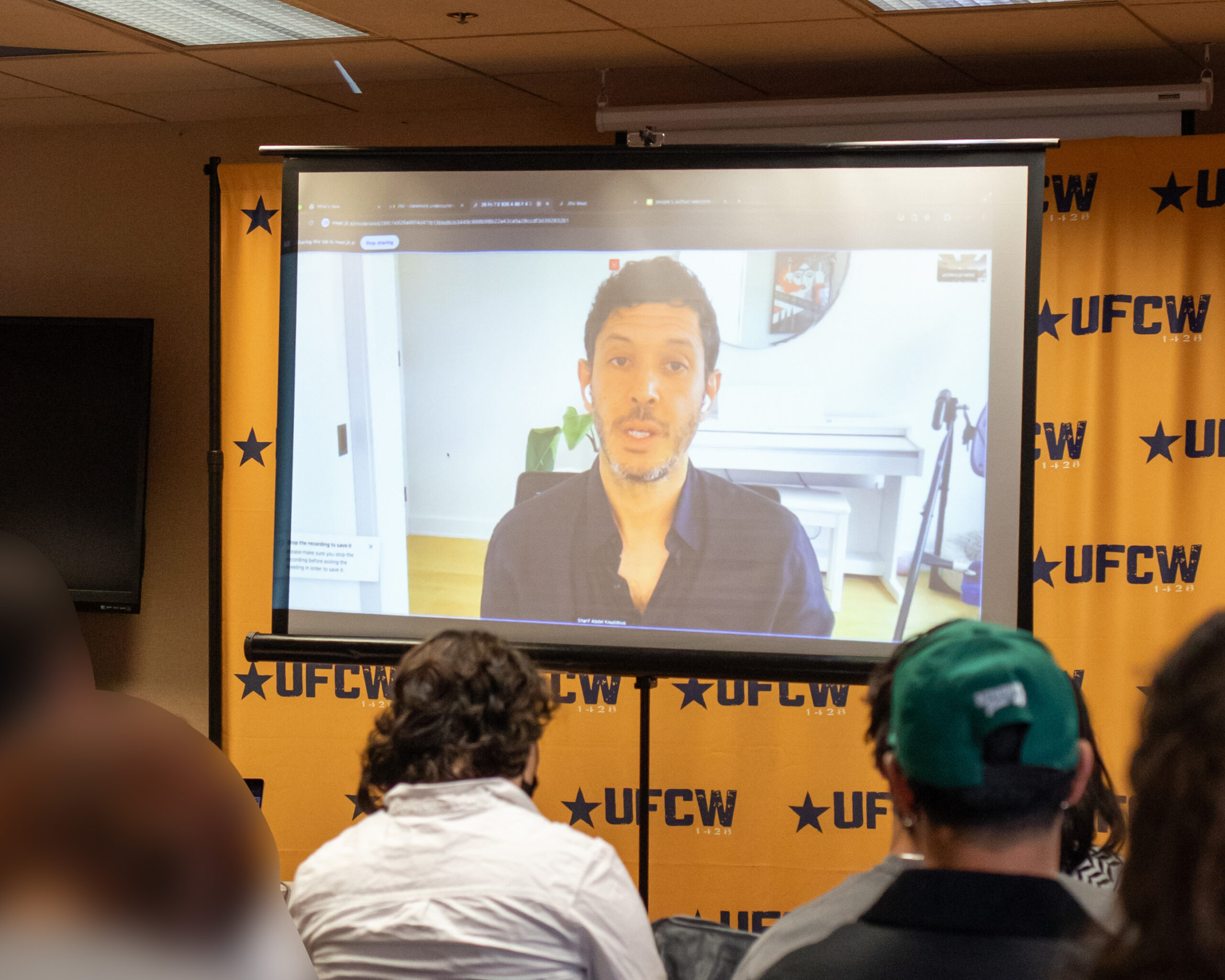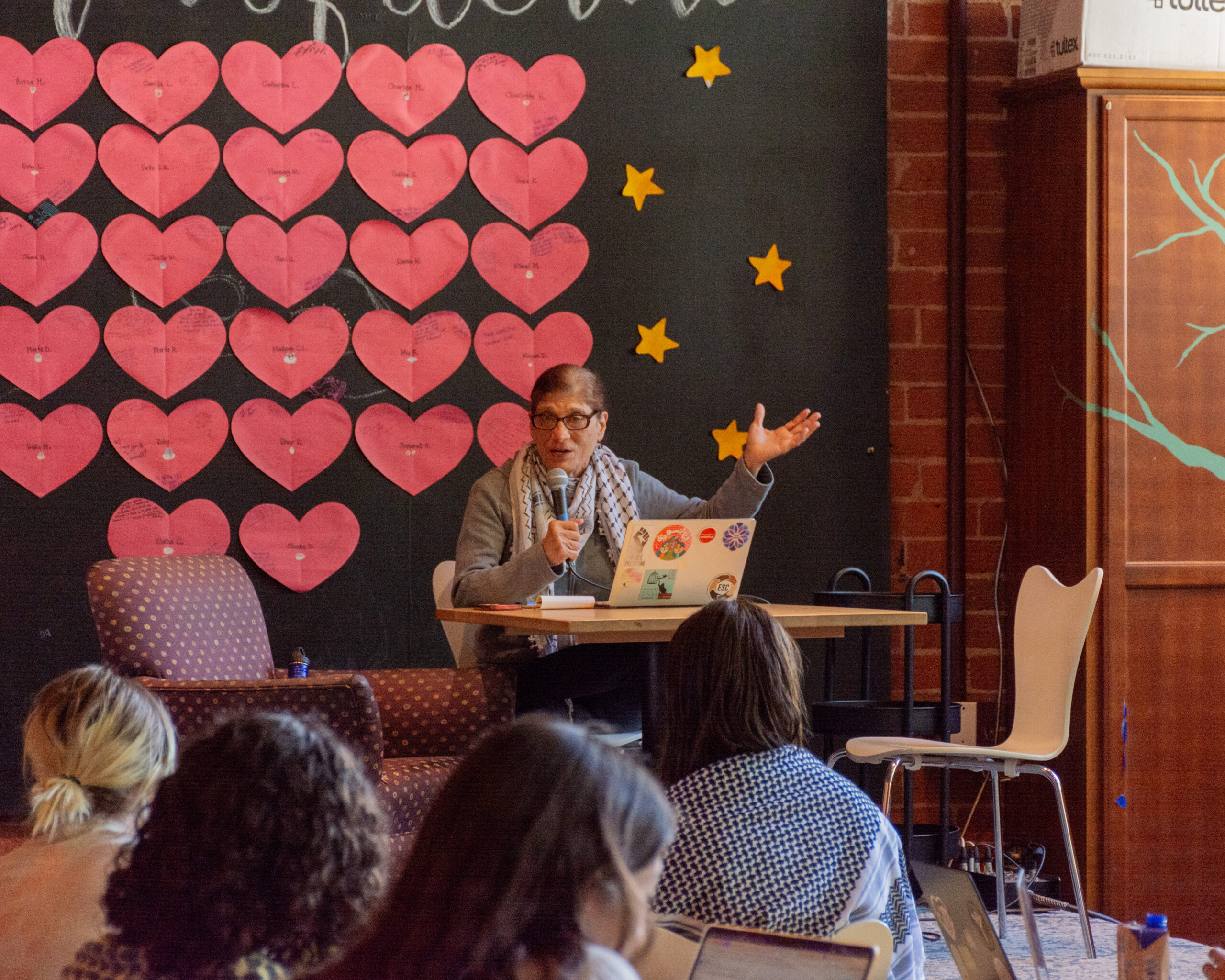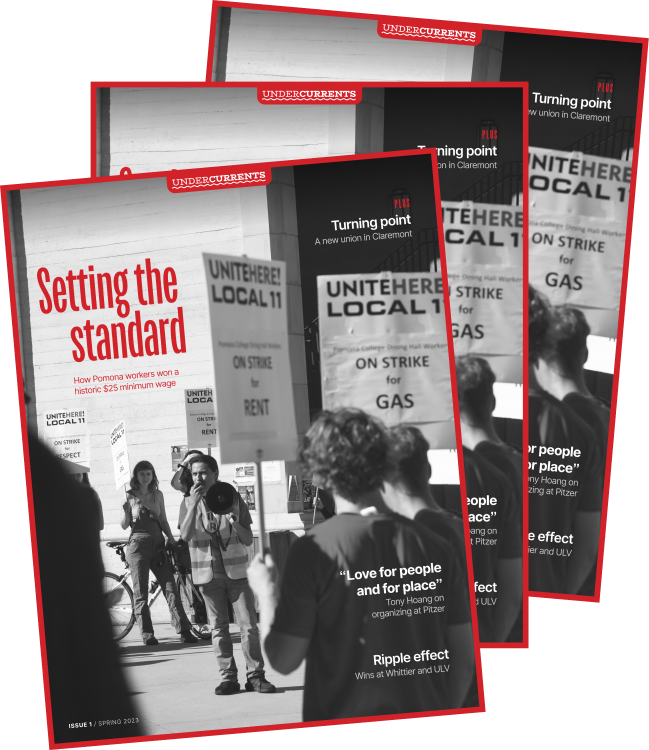
May 15, 2023
A look back on the win that sparked standard-setting fights at Pomona, Whittier, ULV and beyond

At 5 AM on Dec. 9, 2022, the sky still dark and the temperature a frosty 40 degrees, dozens of Pitzer College dining and facilities workers lined up outside McConnell Dining hall, waiting to cast ballots to certify a union they thought they had won four months earlier.
Last August, after a year of campaigning, a majority of Pitzer workers signed union authorization cards to designate UNITE HERE! Local 11 as their union representative, hoping for better pay, benefits and working conditions.
The new union began negotiations for its first contract in September, pushing for higher wages, better healthcare insurance coverage and other benefits. But progress was soon interrupted by the filing of a decertification petition.
“We were in our second or third negotiation meeting when they told us,” said custodial worker Delmy Diaz.
The decertification petition was filed by a Pitzer worker and contained the signatures of 30 percent of workers in the bargaining unit, triggering an NLRB-supervised decertification vote to be held on Dec. 9, 2022.
Though the petition was filed by a worker, union organizers said that Pitzer’s union busting had a role to play. Anti-union intimidation and misinformation from managers contributed to the petition gaining signatures and continued after decertification was put on the table, organizers said.
“What we should be doing right now is agreeing to a union contract. Instead, [Pitzer] decided that they would continue to fight the union and see if they could get out of their obligation to negotiate,” UNITE HERE! organizer Noel Rodriguez PO ‘89 told Undercurrents on the morning of the vote.
But the Pitzer workers weren’t alone.

Several Pomona College dining workers, who faced their own administration’s union-busting ten years ago, including a check for immigration documents that resulted in the termination of seventeen workers, stood in solidarity outside the building. Many also made efforts to share their experiences being represented by UNITE HERE! with Pitzer workers leading up to the vote.
Dozens of students from the Claremont Student Worker Alliance filled in the crowd, carrying banners expressing support for workers. A handful had spent past mornings that week bringing coffee and donuts to workers at the beginning of their shifts.
Finally, UNITE HERE! organizers, including a Pomona alumnus, two Pitzer seniors and an organizer from a nearby Amazon warehouse, chatted with workers and students. Alongside workers in the negotiating committee, these organizers had spent the past months talking with workers to combat intimidation and disinformation. Now they waited to see if it had been enough.
When votes were counted at 4 PM, the votes were 28 in favor, 26 against the union. Though the margin was narrow and showed that “there’s a lot more work to do,” organizers celebrated the win.
“Even in really divided, really polarized, company-trying-to-drive-anti-union-messages conditions, we still won, and I think that’s huge,” said UNITE HERE! representative Natasha Wong PZ ’22.

Today, the Pitzer union is still fighting for its first contract, with the school giving a $2 raise as the National Labor Relations Board arbitrates the contract’s final terms.
The win also had ripple effects beyond Pitzer’s campus. It was a “turning point” in Pomona dining workers’ contract negotiations, UNITE HERE! representative Arun Ramakrishna PZ ’22 said. It gave dining workers at Whittier College and the University of La Verne the confidence to go on strike, winning a contract this April after months of stalled negotiations.
Workers made as little as $17 an hour before the union campaign, with many working second jobs to support themselves and their families. High insurance costs and insecurity over contract duration were also issues workers discussed.
“It shouldn’t even be a question if I’m working full-time [at a private college], but I’m barely making ends meet,” former groundskeeper and union leader Tony Hoang said. “We’re asking for a wage increase because of how hard life is right now with inflation and the cost of living. A lot of us are getting paid wages that are not a living wage, not even close.”
Pit-Stop Cafe lead barista Viridiana Garcia said that she felt disrespected and voiceless before the formation of the union.
“It could be a Friday and you don’t even know if you’re gonna work the weekend that’s coming ahead,” Pit Stop barista Viridiana Garcia said. “I’ve been here about five, six years and it’s always been the same kind of exploitation. Getting overworked, not really having a voice.”
The union drive began underground with a “handful” of Pitzer workers, according to a student organizer who requested anonymity to prevent discrimination in future employment, and grew when leaders reached out to their coworkers to build trust. Early organizing conversations focused on sharing the vision for the union, the organizer said.
They described one early meeting where a Pitzer worker “was feeling hopeless” until workers from another LA county union led him on a tour of their shop to “see the respect that we have and how the working environment is really different.”
“Ever since he went on that tour, that sad, really kind of hopeless meeting in the park never happened again,” the organizer said. “He was totally like, oh my god. I see this vision, I can have this change in my life for my family, for my kids, for myself…and he helped recruit another worker who was super strong.”

Fear of retaliation was also at the core of many organizing conversations, organizers said.
“I was afraid…I didn’t know my rights at the time,” Hoang told Undercurrents. “It was coming from anxiety and thinking like, wow, the bosses are gonna fire me. I’m gonna lose my job. I’m gonna lose my financial stability to take care of my family.”
Organizing conversations are about moving beyond that fear, said UNITE HERE! union representative Natasha Wong PZ ’22.
“It comes down to…moving your way through the fear and into, ‘what could there be though?’” she said. “It really comes down to the workers talking to each other and having those conversations basically deciding on ‘no, like we deserve better, we deserve more, and there’s a clear way to get it, which is forming a union’.”
Organizing at Pitzer involved worker delegations and actions, but also “in general speaking up, being more open and being more proud,” Wong said.
“What does organizing look like? It’s empowering your coworker, your family to say, you deserve better. You have rights. You can actually stand for yourself and say, that’s not okay,” Hoang said.
Managers began union-busting efforts as soon as the campaign went public in May 2022, organizers said. UNITE HERE! filed two legal complaints that month alleging that Pitzer broke federal labor law by telling workers they couldn’t talk about the union on the job, promising benefits to anti-union employees and threatening retaliation if workers joined the union.
“They started giving people random raises, and they claimed it was because of inflation. But…how does one person get $2 versus somebody get 50 cents?” Garcia said. “I think that was their sense of bribery, thinking oh hey, we’ll give them a couple bucks and they’ll hush down.”
Garcia herself was offered a supervisory position after she became involved in organizing the union.
“I think that was also a tactic that they were using to try to get me out of the union bargaining unit,” she said.
Intimidation continued leading up to the decertification election as managers “[dug] in on the fear that people have already of losing their jobs,” Wong said.
Four managers isolated Diaz on Nov. 28 and gave her an official warning for “behavioral issues” after she spoke to coworkers about union-related topics.
“Yesterday I received a written warning stating all kinds of wrongful accusations toward me: behavioral issues, of which I have never even heard my lead or supervisors ever bring to my attention…I believe that this is a tactic to intimidate our workers,” she said at a Nov. 29 delegation to Pitzer administrators with over 40 students and several other Pitzer workers. The warning was rescinded on Dec. 2.

Pitzer also began subcontracting workers through Bon Appetit Management Company after the union drive began — and managers discriminated against subcontracted workers who expressed support for the union by wearing UNITE HERE! pins, eventually terminating three of them in retaliation, according to Unfair Labor Practices later filed by the union.
“[They’re] digging in on the fear that people have already of losing their jobs,” Wong said. “It’s not an election to have a union. We already won the election to have a union. We already have representation, we already have those union rights.”
Organizers also had to contend with misinformation about the union disseminated by management and some workers, including a smear site targeting UNITE HERE! Local 11 that claims the union’s “primary goal is to expand its membership rolls and increase dues revenue—by any means necessary.”
The countermeasure was to talk about the specific impacts of unionization, organizers said. And unlike the smear website, “we have proof,” Hoang said.
“If I tell someone, hey, this is what the union will do, this is how it’ll change your life, this is what we can bargain for…we actually have proof of this stuff,” he said. “The bosses, they don’t have any proof. They’re pulling stuff off of websites…and then just feeding it to these people.”
Pomona workers also visited Pitzer workers and continued share their experiences.
“They’ll come and tell us, ‘we hear that you guys are paying $500 a year for this, we hear you guys are paying such and such money for your health insurance’…that’s just [from] the anti-union people telling their lies,” said Aaron Archer, a cook at Pomona’s Cafe 47. “We just tell them, do you want to hear the truth? Come straight to the source.”
Active union-busting was compounded by larger structures of worker disempowerment, organizers said. Many Pitzer workers don’t have education beyond high school, don’t speak English fluently or don’t have U.S. citizenship, Hoang said.
“If you’ve been in this [system] and you’ve been abused, how can you see that as anything other than normal? But that’s part of the system. It’s part of what they want, what the school wants,” he said.
These larger issues contributed to the narrow vote margin, said Marie Ocampo, who has worked for Pomona as a caterer and baker for eight years.
“I know that there are still a lot of workers there who are on the fence, and it’s because of that long abuse: ‘You don’t deserve better. For someone with your background, your educational level, that this is the best it’s going to get,’” Ocampo said. “It’s sad to see that they’re not here, but eventually, we’ll get them.”
But organizing leading up to the decertification petition also strengthened many workers’ confidence in being part of the union.
“It gave us the opportunity to talk more with our coworkers and really inform them and get them and ourselves to be stronger,” Wong said. “We got to see that [the morning of the vote] with all the workers that showed up. All our hard work has led to this point.”
Pro-union workers also became more vocal leading up to the vote, Diaz said.
“Some people that were kind of iffy, were kind of scared, now they’re like super strong and super confident,” Diaz said. “The committee members, I feel like we’ve just grown so much…we’ve been able to refine our own understanding of what this all means and being able to empower coworkers the same way.”
Organizing was hard work, with workers sacrificing time and energy on top of their full-time shifts. But the goal make it worth it, Hoang said.
“I work a full eight hours Monday through Friday. Right after work, sometimes I have to talk to a coworker, organize some folks, organize myself…my work day turns into a 12 hour work day, and I’m not getting paid for that,” he said. “Why do I continue to do it? Because I know how good this will be. Being able to negotiate and ask for what I want for my life is really important.”
The win means the union can return to focusing on its first contract for Pitzer workers, and also raises the standard for not just the 5Cs, but food service and hospitality workers across the Inland Empire, Wong said.
“The Inland Empire doesn’t have very high union density. One more union shop adds to that,” she said.
Kaylyn Bolanos, Jacob Neville, Charlie O’Brien and Jacob Ragaza contributed reporting.


Commentary

Palestine

Palestine

Undercurrents reports on labor, Palestine liberation, prison abolition and other community organizing at and around the Claremont Colleges.

Issue 1 / Spring 2023
Setting the Standard
How Pomona workers won a historic $25 minimum wage; a new union in Claremont; Tony Hoang on organizing
Read issue 1